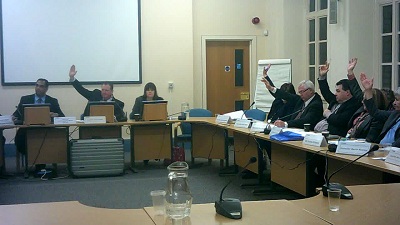Who will choose Wirral Council’s new Chief Executive?
One of the bigger stories on this blog recently has been the news that the current Chief Executive for Wirral Council Graham Burgess has handed in his notice and will retire at the end of the year.
So as Wirral Council has the Chief Executive’s three-month notice period (30th September 2014 to 31st December 2014) to find his replacement, what’s happened so far?
Well because the Chief Executive is a political appointment of councillors, the politicians have to decide. So a meeting of the Employment and Appointments Committee has been set up for the 27th October 2014. Graham Burgess is also currently Returning Officer (many people reading this may also know what a Returning Officer is but in simple terms it’s the head person at Wirral Council for elections), Electoral Registration Officer (another role to do with elections) and Head of Paid Service.
So what’s the timetable for picking a new Chief Executive and will one be in post by 1st January 2014? According to the draft timetable it won’t so temporary appointments will have to be made! The proposed timetable means the job advertisement will be advertised around the start of December 2014, which will give people until nearly a week after Graham Burgess leaves to apply for his job.
It is proposed that Penna PLC be paid about £15,000 for helping find a new Chief Executive and a further about £15,000 for finding a new Head of Specialist Services (who is also leaving in December 2014).
However paying out about £15k to Penna PLC to aid Wirral Council’s Human Resources department is not enough! No a “professional adviser” from the Local Government Association will also be advising the Appointments Panel.
This in fact has always struck me as a bit of an anomaly. Penna PLC and the LGA aren’t officers or councillors at Wirral Council. In the past though, they’ve remained in the meeting room after the press and public were excluded from the public meeting.
So who is the Appointments Panel going to be and what will it do? It will consist of seven councillors who will make a recommendation for the post of Chief Executive to the sixty-six councillors. It will probably be four Labour councillors, two Conservative councillors and one Lib Dem councillor. I have some guesses now below about who will make up this appointment panel for the Chief Executive. It hasn’t yet been decided yet which councillors will be on it, but below are my names along with my reasons:
Labour (4 councillors)
Cllr Adrian Jones * reason is already Chair of Employment and Appointments Committee
Cllr Phil Davies * reason is already Vice-Chair of Employment and Appointments Committee & Leader of the Council
Cllr George Davies * reason is Deputy Leader of Wirral Council, Cabinet Member and Labour councillor on Employment and Appointments Committee
Cllr Ann McLachlan * reason is Deputy Leader of Wirral Council, Cabinet Member and Labour councillor on Employment and Appointments Committee
* Note although Cllr Moira McLaughlin is a possibility, she’s unlikely for the reasons listed above
Conservative (2 councillors)
Cllr Jeff Green * reason there are only 2 Conservative councillors (apart from deputies) on Employment and Appointments Committee
Cllr Lesley Rennie * reason there are only 2 Conservative councillors (apart from deputies) on Employment and Appointments Committee
Lib Dem (1 councillor)
Cllr Phil Gilchrist * reason only Lib Dem (apart from deputies) on Employment and Appointments Committee
The seven councillors on the Appointments Panel will all be from the Employment and Appointments Committee and due to the high-profile nature of the appointment unlikely to be deputies. The Employment and Appointments Committee has eight councillors on it (plus twenty-one deputies). So the seven will come from those twenty-nine.
The Appointments Panel doesn’t actually choose the Chief Executive though. They just recommend who the Chief Executive should be to a meeting of all sixty-six councillors at Wirral Council.
From a practical perspective though, as Labour have a majority of councillors on the Appointments Panel and Wirral Council it will be down to the Labour councillors to decide who the next Chief Executive/Returning Officer/Electoral Registration Officer/Head of Paid Service is. As the process will probably be going on after Graham Burgess leaves and it’s a legal requirement to have somebody appointed to some of these roles, temporary people will have to be found before a permanent appointment is made.
Looking back to July 2012 when Graham Burgess was appointed as Chief Executive by Council, he then had to serve his period of notice before starting in post in September 2012.
If the new Chief Executive has to also serve out a period of notice, it could be as late as May 2015 before he or she starts (which if it is after General Election and local elections it will make the election side of their job easier).
Certainly it will be interesting to see who the politicians eventually recommend for this key post at Wirral Council! If anyone wishes to leave a comment comparing the appointment of Wirral Council’s Chief Executive to the complicated process of appointing a Doge of Venice, feel free.
If you click on any of the buttons below, you’ll be doing me a favour by sharing this article with other people.


